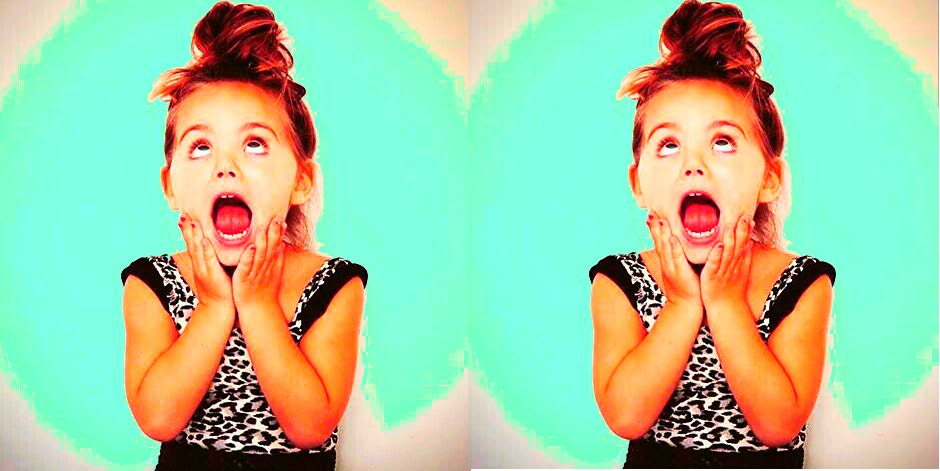Why I Have ZERO Guilt Parenting Your Horribly-Behaved Kids
Allow me to do your job for you.
 weheartit
weheartit When I was 12 years old, I was teased for being poor. Sure, we weren't poor by conventional standards (we had a three bedroom, one bath apartment, a full(ish) fridge, and a family car) but we didn't have spending money. We didn't have movie money, pizza money, or name brand apparel money.
I was mocked for wearing sweatpants from Walmart, which were two sizes too small (hello, highwaters!) and green canvas "kids." I think that's what knock-off Keds were called.
When I was 13, my classmates had something new to ridicule: my full-body back brace. I was diagnosed with scoliosis after being diagnosed with a heart murmur and had to wear a brace — from the top of my pelvis to the pit of my arm — for 16 hours a day. Sixteen hours!
It was made of hard PVC so it was painful and noticeable in any outfit. Even if you couldn't see the brace you couldn't help but notice the extreme angle it made me walk at, and I was called everything from Quasimodo to gimp, cripple, and even the ever-painful freak.
I was the girl with the broken body. I was the girl, the quiet geek, who wanted to fit in but couldn't. I was the girl with frizzy, unkempt hair, no style, and no father.
For years I said nothing. I didn't stand up for myself. I didn't stand up for others and I was a quiet, passive, agreeable mess. I became so afraid of confrontation, so afraid of losing friends, I'd lie to your face to avoid a fight. I'd lie to your face to "protect you" and keep you happy. I'd lie to your face to avoid the shame of the truth.
Then I became a mom.
I became a mom who looked at the world differently, a mom who would do anything to protect her own child, a mom who was willing to change the world —and change herself to do so.
And while I didn't change instantaneously, I did see a shift in myself as my daughter grew, as I saw the way other kids interacted at the playground, at the park, at the pool, and even at school.
But it wasn't until one day this past July that I snapped.
I saw a young girl, maybe 10 or 11 years old, standing at the water's edge and being ridiculed for being too scared to jump in and being bullied for wearing a swimsuit that was a bit too tight. I lost it.
It wasn't until I watched her — I never saw her face, but the way her shoulders slouched forward told me she was dejected, and the way her body moved told me she was crying — that I decided I had to step in; I had to say something — for her, for others, and for me.
Children are vulnerable. Preschool-aged children and younger struggle to make sense of most emotions, slipping from states of laughter and smiles to full on screaming fits in an instant.
Preteens find themselves dealing with a complex new set of feelings thanks to puberty, and teenagers may feel and look like adults. But from a neurological standpoint, they aren't.
While the grey matter, which handles memory, attention, concentration, and self-regulation, "matures when we're between 11 and 12 years old," the white matter, which affects the way we process emotions, will not be "completely developed until we're in our early twenties."
This means, physically speaking, kids' minds are undeveloped. Their emotional responses aren't yet stable, they may appear impulsive or short-tempered, and they're unable to see the "entire picture."
Which is all the more reason why they need parental guidance. They need our experience, our support, and our advice.
We're responsible for giving our children the tools they "need to succeed."
We're responsible for being their barometers of right and wrong.
We're responsible helping them through these difficult developmental years.
And that's why exactly why I have no problem parenting other people's kids.
Don't get me wrong. I'm not a disrespectful b*tch. If and when the child's parent is present I will defer to them and I don't say something every time I see a child screaming or crying or acting a damn fool because ... well, sometimes sh*t happens.
If, however, I see name calling, hitting, slapping, biting, kicking, or generally "not nice" behavior going on, I will speak up. I will ask the parent if they need anything or — when not present — I will tell their children their behaviors are unacceptable, though what I say and how I say it will change relative to their age.
Does that make me obnoxious? Perhaps. But some children need an advocate. Some children need a voice. And I'd rather be that voice. I'd rather make sure they're OK and help them than find out they became just another terrifying, tragic statistic.

